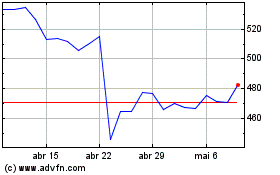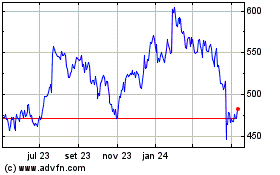By Chao Deng
Increasing odds of a December rate increase in the U.S. is
pushing Asian shares lower this week, overshadowing global central
banks' stimulus cues, which drove a rebound in the region just last
month.
The MSCI AC Asia Pacific Index is on track to slip 0.1% this
week through its close Thursday, and is up only 2.3% so far this
month. It rallied 8.1% in October.
Individual stock benchmarks in Australia, South Korea and Hong
Kong all lost more than 2% this week. The Nikkei Stock Average,
however, gained 1.7% and was at its highest in 2 1/2 months earlier
in the week as the Japanese yen reached its weakest level since
late August, a boon for the country's exporters.
On Friday, most markets in the region fell sharply, with the
Hang Seng Index down 2.2%, amid sliding oil prices and jitters
about the prospect of higher borrowing costs.
According to a recent poll of business and academic economists
by The Wall Street Journal, about 92% said they expect the Fed to
raise its benchmark federal-funds rate at its Dec. 15-16 policy
meeting, a sharp increase since immediately after the October
meeting.
On Thursday, comments from Fed officials--including Chairwoman
Janet Yellen and regional Fed presidents William Dudley, Charles
Evans and Jeffrey Lacker--provided little clarity on the central
bank's stance.
"People are on edge," said Andrew Sullivan, managing director at
Haitong Securities. Investors "aren't going to change their
positions" substantially before December.
The renewed focus on U.S. rates is a switch from recent weeks
when hopes for easing measures by central banks in Europe, Japan
and China buoyed shares.
Expectations of higher rates have strengthened the dollar, one
of the major factors pressuring commodities prices recently. Many
materials are priced in dollars, so a stronger currency makes them
more expensive to global buyers. China's slackening demand for
industrial materials has also sent commodities prices back to
multiyear lows.
This week, falling commodities prices pressured Australia's
S&P/ASX 200. The index has shed the bulk of its 6% bounce from
late September to late October.
The benchmark is off 3.6% month-to-date, with the heft of those
losses this week. Australia's shares fell 1.5% on Friday, dragged
by its energy sector, after crude oil tumbled overnight.
On Thursday, three-month copper prices hit a fresh six-year low
of $4,800 per ton and gold settled at the lowest price in more than
five years.
Copper last traded at $4,825.50 per ton, up from their opening
price of $4,823 a ton. Gold prices were last flat at $1,081.80 an
ounce from late in Asia Thursday.
A stronger U.S. dollar pushed down the Japanese yen earlier in
the week to as weak as Yen123.14 to the dollar. The yen was last at
Yen122.77 to one U.S. dollar, weakening by 0.2% from its late level
yesterday.
An imminent move by the Fed is sidelining investors in Hong
Kong, too, analysts say.
The Hang Seng Index lost 2.1% this week, while the Hang Seng
China Enterprises Index was off 3.6%.
Trading volumes in Hong Kong, at a daily average of 75 billion
Hong Kong dollars ($9. 68 billion), are down roughly a third from a
peak of HK$292 billion in April.
Meanwhile, some analysts say that Chinese firms listed in Hong
Kong have gotten increasingly attractive. They now trade near their
cheapest in two months compared with their mainland
counterparts.
A-shares or yuan-denominated mainland shares are roughly 40%
more expensive than H-shares or Hong Kong-listed Chinese firms,
compared with 21% in late October, a recent low.
On Friday, shares of BHP Billiton Ltd., Australia's largest
mining company, were down 1.8%, after the company said it was in a
dispute with the tax office in the Australian state of Queensland
over coal royalty payments.
Shares of Singapore-listed Noble Group Ltd. fell 10%, after the
commodities trader's chief financial officer resigned on
Thursday.
The company also said its net profit slid 84% in the third
quarter, following nine months of criticism of the company's
financial reporting. Shares are off 60% since the beginning of the
year.
Write to Chao Deng at Chao.Deng@wsj.com
(END) Dow Jones Newswires
November 13, 2015 03:46 ET (08:46 GMT)
Copyright (c) 2015 Dow Jones & Company, Inc.
MSCI (NYSE:MSCI)
Gráfico Histórico do Ativo
De Jun 2024 até Jul 2024

MSCI (NYSE:MSCI)
Gráfico Histórico do Ativo
De Jul 2023 até Jul 2024
